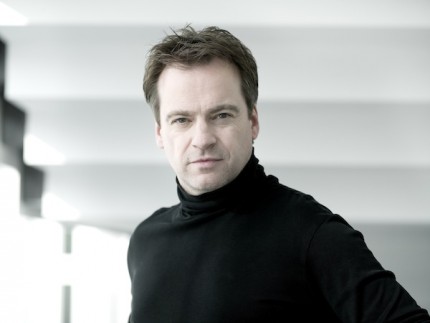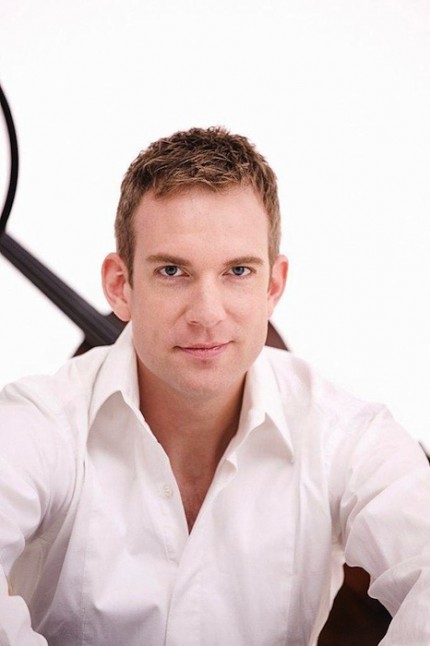Nott, Moser strike sparks to open CSO’s new year
“Hello, I must be going,” was a Groucho Marx song lyric but it also characterizes the Chicago Symphony Orchestra’s local profile in the new year. The CSO is performing just a single week of concerts in January, before taking off on an extended three-week Asian tour with Riccardo Muti.
That Thursday night’s concert at Orchestra Hall offered performances on a much higher level than a post-holiday prep exercise for a long tour, was a testament to the players’ responsiveness to conductor Jonathan Nott, as well as a triumphant return for cellist Johannes Moser.
At Wednesday’s Afterwork Masterworks program, CSO bass Stephen Lester read a tribute to the late Pierre Boulez from the musicians and the orchestra played Bach’s Air from the Third Orchestral Suite in his honor. Considering Boulez’s stature and long and significant relationship with the CSO, it’s inexplicable that the gesture was not repeated on Thursday and that the only acknowledgement of Boulez’s passing earlier this week was a program insert.
Two German cornerstones framed the evening. Nott opened the program with a bracingly fresh and vital account of Brahms’ Academic Festival Overture. With superb trumpet playing, the rendering had a jaunty collegiate spirit nicely centered within textures of Brahmsian weight, full yet transparent.
Haydn’s music gets somewhat short shrift at Orchestra Hall, so it was a welcome occasion to hear the composer’s Cello Concerto in C major, played by Johannes Moser.
The German-Canadian cellist has not appeared locally in a decade—ironically his youthful 2005 CSO debut was conducted by Pierre Boulez. But Moser’s fizzing rendition of Haydn’s galant concerto should ensure that he will be invited back to Chicago much more expeditiously.
Moser is one of those rare musicians who seems incapable of playing a single bar in a dull or dutiful way. The cellist brought buckets of personality to this music, overlaying Haydn’s graceful themes with an edgy aggressive bravura that made for exhilarating results. Time and again he enlivened the score with a quick accelerando burst, hairpin dynamic turn and nervy virtuosity that brought a modern bite to the music.
Playing Wen-Sinn Yang’s clever cadenzas, Moser plumbed surprising emotional depth in the Adagio, and was off to the races in the finale. Even with its Allegro molto marking, it’s unlikely one will ever hear the closing movement played as fast as this, Moser managing somehow to maintain clean articulation and accurate intonation at lightning speed, making for exhilarating results. Nott led an alert accompaniment that followed his soloist’s tempo fluctuations and dynamic flourishes with striking precision.
Theodore Thomas and the CSO gave the U.S. debut of Richard Strauss’ Ein Heldenleben in 1900, just one year after the composer led the Frankfurt premiere. A century later, “A Hero’s Life” continues to provoke debate, some seeing the tone poem for large orchestra as an exercise in Strauss’s untrammeled egotism, the composer painting himself as the titular hero.
But Strauss’s whipcrack scoring, satiric humor and deep vein of emotional richness make Heldenleben among his greatest works. Beyond the personal musical references, there is a universality in the hero’s struggle with adversaries; respite from arduous work and career frustrations provided by a loving–if querulous–partner; and ultimate reflective satisfaction with good works that broaden the tone poem far beyond the composer’s own life.
Under Nott’s attentive yet flexible direction, the CSO delivered a commanding, boldly projected performance. The opening Hero’s Theme went with big, striding confidence, while his adversaries–Strauss’s withering depiction of music critics–brought out their wheedling irrelevance with wimpy, nattering high winds and pompous tuba.
The English conductor kept skillful balances throughout, even avoiding overkill in the mock-battle scene, while the players powerfully put across the off-kilter alarums and excursions from the expanded brass arsenal. Nott and the orchestra brought an organic flow to the fleeting quotations from Strauss works (“The Hero’s Works of Peace”), and Scott Hostetler’s Alpine-flavored English horn solo bestowed the right sense of relaxed contentment in the final bars.
Rested from the holiday break, the CSO played magnificently across all sections with notable brass contributions. Concertmaster Robert Chen’s depiction of the Hero’s Helpmate—a portrait of Strauss’s formidable wife, soprano Pauline de Ahna—was somewhat more small-scale and less mercurial than usual, though his silvery-sweet violin solo contributed apt glowing tenderness in the coda.
The program will be repeated 8 p.m. Saturday. cso.org; 312-294-3000.
Posted in Performances





Posted Jan 08, 2016 at 4:06 pm by Tod Verklärung
There is, in fact, an explanation of why the tribute to Boulez was only done once, although no guarantee it is the real one. The CSO takes little interest in conductors of the past, with the possible exception of Georg Solti. For a time within the Muti era, for example, names like Giulini and Abbado, past Principal Guest Conductors, were eliminated from the CSO history within the program booklets. Similarly, the “From the Archives” series of CDs, self-produced by the CSO, was discontinued a few years back.
Finally, the rich library of more recent “live” performances by many wonderful guests has not been tapped since Muti’s arrival for anything but an occasional broadcast recording under the Music Director on the “CSO Resound” series of discs. The focus of the orchestra is very much on the present, with the ironic exception of a repertoire that resides in the past and is put to shame by orchestras in San Francisco, New York, and even Milwaukee and Northbrook.